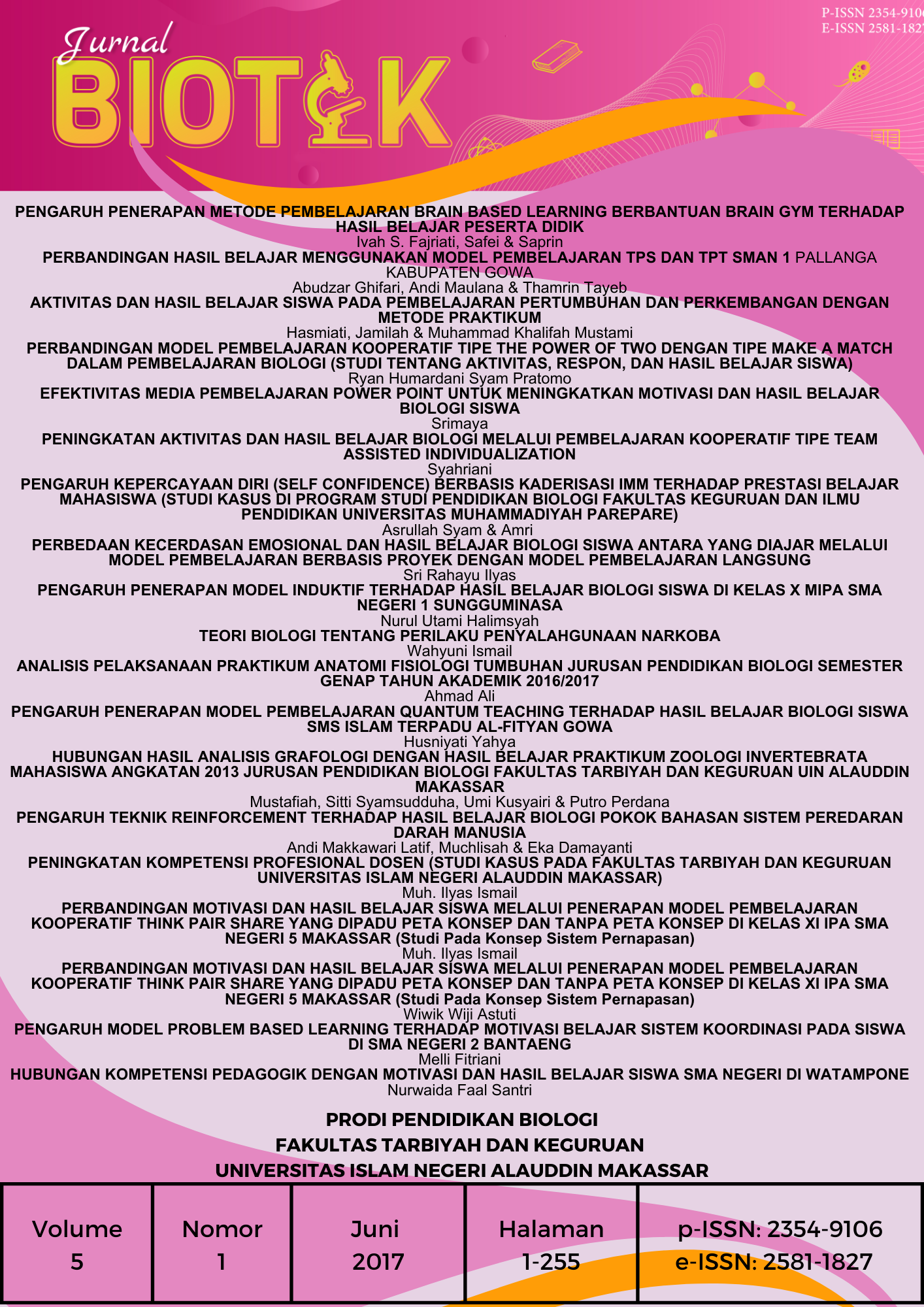HUBUNGAN KOMPETENSI PEDAGOGIK DENGAN MOTIVASI DAN HASIL BELAJAR SISWA SMA NEGERI DI WATAMPONE
Abstract
This study aimed at examining (1) significant correlation of pedagogy competence of Biology teacher toward student’s learning result both directly and indirectly through student’ learning motivation. (2) significant correlation between pedagogy competence of Biology teachers and students’ learning motivation; (3) significant correlation between pedagogy competence of Biology teachers and student’s learning result. This study is an ex-post facto. The population of the study were the entire students at SMAN in watampone of academic year 2013/2014. The samples were taken by employing random class technique with as many as 496 students. Data were collected through questionnaire and documentation. Data were analyzed using reggressin test and path analysis. The results of the study were (1) pedagogy competence gave influence directly to learning result with coefficient path (p) by 16.5%; whereas,it gave influence indirectly to learning motivation by 42.6% (2) there was correlation (p < 0.05) between pedagogy competence and students’ learning result on biology subject at SMAN in Watampone with coefficient (r) by 64.3%; (3) there was correlation (p < 0.05) between pedagogy competence and students’ learning motivation at SMAN in watampone with coefficient correlation (r) 64.1%;
Downloads
References
Arikunto, Suharsimi. (2005). Prosedur Penelitian: Suatu Pendekatan Praktek. Jakarta: Rineka Cipta. `
Fatah Yasin, Ahmad. (2011). Pengembangan Kompetensi Pedagogik Guru Pendidikan Agama Islam Di Madrasah. Jurnal eL-Qudwah. Vol 1.No. 5 edisi April 2011.
Hidayati, Nuralaila. (2009). Pengaruh Kompetensi Guru terhadap Motivasi belajar siswa pada Madrasah Aliyah Negeri 3 Malang. Tidak Diterbitkan. Universitas Negeri Malang
Islamuddin, Haryu. (2012). Psikologi Pendidikan. Yogyakarta: Pustaka Pelajar
Purwanto. (2013). Evaluasi Hasil Belajar. Yogyakarta: Pustaka Pelajar.
Sagala, Syaiful. (2009). Konsep dan Makna Pembelajaran. Bandung: Alfabeta.
Sanjaya, Wina. (2008). Strategi Pembelajaran Berorientasi Standar Proses Pendidikan. Jakarta: Kencana Prenada Media.
Sudjana, Nana. (2004). Dasar-dasar Proses Belajar Mengajar. Bandung: Sinar Baru Algensindo.
Sugiyono. (2010). Metode Penelitian Pendidikan: Pendekatan Kuantitatif, Kualitatif, dan R & D. Bandung: Alfabeta.
Umam, Nova Chotibul (2010). Pengaruh Kompetensi Pedagogik Guru danFasilitas Belajar Terhadap Hasil Belajar Siswa SMK Kelas XI Tamansiswa Kudus. Tidak Diterbitkan. Universitas Negeri Semarang.
Usman. Moh. Uszer. (2001). Menjadi Guru Profesional. Bandung: Remaja Rosdakarya
________________. (2012). Menjadi Guru Profesional. Bandung: Remaja Rosdakarya
Utomo. Puri. (2011). Hubungan Antara Kompetensi Guru dan Motivasi Belajar Siswa Dengan Prestasi Belajar Siswa Kelas XI SMK Surakarta. Ed Vokasi: Jurnal Pendidikan Tekanik Kejuruan, 1(1), 1-8.
Wahyudi, Imam. (2012). Mengejar Profesionalisme Guru Strategi Praktik Mewujudkan Citra Guru Profesional. Jakarta: Prestasi Pustakarya.
Authors who publish with Jurnal Biotek agree to the following terms: Authors retain the copyright and grant Universitas Islam Negeri Alauddin Makassar right of first publication with the work simultaneously licensed under a Creative Commons Attribution License (CC BY-SA 4.0) that allows others to share (copy and redistribute the material in any medium or format) and adapt (remix, transform, and build upon the material) the work for any purpose, even commercially with an acknowledgement of the work's authorship and initial publication in Universitas Islam Negeri Alauddin Makassar. Authors are able to enter into separate, additional contractual arrangements for the non-exclusive distribution of the journal's published version of the work (e.g., post it to an institutional repository or publish it in a book), with an acknowledgement of its initial publication in Universitas Islam Negeri Alauddin Makassar. Authors are permitted and encouraged to post their work online (e.g., in institutional repositories or on their website) prior to and during the submission process, as it can lead to productive exchanges, as well as earlier and greater citation of published work (See The Effect of Open Access).

This work is licensed under a Creative Commons Attribution-ShareAlike 4.0 International License.



